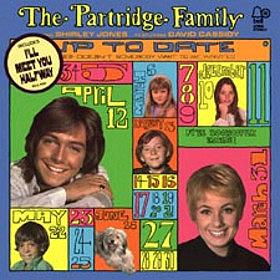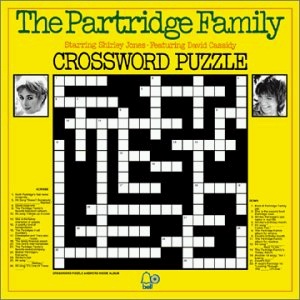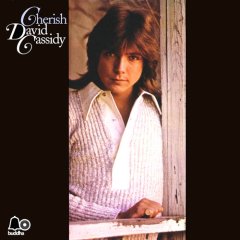Related Research Articles

The Partridge Family is an American musical sitcom created by Bernard Slade, which was broadcast in the United States from September 25, 1970, to March 23, 1974, on ABC.

The Partridge Family Album is the first of eight studio albums by The Partridge Family. The LP was released in October 1970, a month after the debut of the ABC-TV musical sitcom The Partridge Family starring Shirley Jones and featuring David Cassidy, both of whom feature on the album, as do studio backing vocalists and session musicians. The success of the album – which in early January 1971 reached no. 4 on Billboard's Top LP's chart – was bolstered not only by the hit TV show but by the album's one single release, the massive hit "I Think I Love You", which for three weeks in November and December 1970 topped Billboard's Hot 100 and which NARM declared best-selling single of 1970.

Up to Date is the second studio album by The Partridge Family. Released in February 1971, just four months after the group's debut LP, the album entered Billboard's Top LP's chart in early April, having been certified gold on 25 March 1971. In its fourth week on the Top 200, the album improved on its predecessor, reaching no. 3.

The Partridge Family Sound Magazine is the third studio album by TV-linked pop project The Partridge Family. Released in August 1971 before the start of the second season of the US TV series, it was their third hit album in ten months. In late September 1971, in its fifth week on Billboard's Top LP's chart, the album reached its no. 9 chart peak. In that same week the album's one hit single release, "I Woke Up In Love This Morning", peaked at no. 13 on Billboard's Hot 100. The LP was certified gold that same month. Sound Magazine is nearly universally regarded – by both fans and critics – as the Partridge Family's consummate pop album.

Shopping Bag is the fifth studio album by TV-linked pop project The Partridge Family. Released in March 1972, just as the second season of the TV series was finishing in North America, the album entered Billboard's Top LP's chart in late March, peaking at no. 18 in late April. The album remained in the Top 200 for 17 weeks and was certified gold. The vinyl release of the album contained a novelty plastic shopping bag.

Crossword Puzzle is the seventh and penultimate studio album by The Partridge Family. Released in June 1973, it was the last Partridge Family album to chart in the US, entering Billboard's Top LP's chart in July and peaking at no. 167 in its second of just five weeks in the Top 200. Bell Records, losing faith in the group after oversaturating the market with product, chose not to release a US single from the album, though "Sunshine" was released as a single in Japan.

Bulletin Board is the eighth and final studio album by The Partridge Family, released by Bell Records in October 1973. The album was recorded between July and September 1973. Bulletin Board was the first Partridge Family album to fail to chart on Billboard's Top LP's chart. "Looking for a Good Time" b/w "Money Money" was released as a single in November 1973, but failed to chart. This was the last regular U.S. Partridge Family single.

The Partridge Family Notebook is the sixth studio album by The Partridge Family. Released in November 1972, the album entered Billboard's Top LP's chart in December, peaking at no. 41 in January 1973 – the same week in which its lead single, a cover of Barry Mann and Cynthia Weil's "Looking Through the Eyes of Love", peaked at 39 on Billboard's Hot 100. The album remained in the Top 200 for 16 weeks, and was the first by the Partridge Family not to reach the Top 40.

A Partridge Family Christmas Card is a Christmas album by the Partridge Family, released in November 1971. The album's case contains a reproduction of a Christmas card signed by the whole Partridge Family, the stars of a 1970s sitcom. The song "My Christmas Card to You" was original, but the remainder of the tracks were standards. Like most of the Partridge Family songs, the lead vocals are sung by David Cassidy, who played Keith Partridge in the show. The album also features one of the few Partridge Family recordings featuring Shirley Jones as the lead singer.

"Suicide Is Painless" is a song written by Johnny Mandel (music) and Michael Altman (lyrics) for the 1970 film M*A*S*H. In addition to being performed by characters in the film, it plays during the title sequence as sung by The Ron Hicklin Singers. An instrumental version was used as the theme music for the TV series based on the film, playing over the opening and closing credits.

Cherish is the debut solo album by American singer David Cassidy, produced by Wes Farrell and released by Bell Records in early 1972.
Doreen Chanter is a British singer best known as a member of the Chanter Sisters, and for her work as a backing vocalist and session vocalist, primarily during the 1970s and 1980s.

Come On, Get Happy! The Very Best of The Partridge Family is a greatest hits compilation album from The Partridge Family released on May 3, 2005, in conjunction with the first season DVD collection. It contained some previously unreleased songs. During the course of the television series there were a number of recordings that were used on the program but never released on album or tape in stereo. Some were alternate mixes of released songs. These are known to fans as the "Lost Songs", four of which appear on this collection. They are noted as "new release" in the track listing below. Two of the songs appeared in the pilot episode of the show, tracks 9 and 12, listed below as having Ron Hicklin doing the vocals. Originally, the only cast member who was supposed to sing was Shirley Jones. After the producers heard David Cassidy's demos of the songs, however, they decided to let him sing after the first couple of episodes.
Jackie Ward, better known as Robin Ward, is an American singer, regarded as a "one-hit wonder" of 1963 million-selling song "Wonderful Summer". However, using her real name she was highly accomplished and successful singing in groups. Ward's voice is heard in U.S. television series, motion pictures, advertisements, and pop records. She is one of the real singers of the hits attributed to The Partridge Family.

"I Think I Love You" is a song by Tony Romeo, written as the debut single for fictional musical TV family the Partridge Family. It was released in August 1970, a month prior to the debut of the ABC-TV musical sitcom The Partridge Family starring Shirley Jones and featuring David Cassidy, both of whom appear on the record, with Cassidy as lead vocalist. The single topped Billboard's Hot 100 for three weeks in November and December 1970 and later was certified by NARM as the best-selling single of 1970.
The Ron Hicklin Singers were a group of Los Angeles studio singers contracted and organized by Ron Hicklin. They are mostly known as the real singers behind the background vocals on The Partridge Family recordings.
John Bahler is an American vocalist, arranger, conductor, composer and producer. He is the elder brother of singer Tom Bahler, and the husband of Janet Lennon of the Lennon Sisters.
Thomas Lee Bahler is an American singer, composer, songwriter, arranger, producer and author. Bahler is most known for his song "She's Out of My Life", which was recorded by Michael Jackson; the song was originally written for Frank Sinatra, who never recorded it. He is the younger brother of the singer, arranger, conductor and composer John Bahler.
"Rock and Roll Lullaby" is a 1972 hit single performed by B. J. Thomas. It was written by Barry Mann and Cynthia Weil.

The Flintstone Comedy Hour is an American animated television series and a spin-off of The Flintstones and The Pebbles and Bamm-Bamm Show, produced by Hanna-Barbera, which aired on CBS from September 9, 1972, to September 1, 1973. It was re-titled The Flintstone Comedy Show for a second season of reruns as a half-hour show from September 8, 1973, to January 26, 1974.
References
- 1 2 "Meet The Love Generation!". www.cmongethappy.com.
- ↑ "Let the Good Times in: The Best of the Love Generation - the Love Generation | Songs, Reviews, Credits | AllMusic". AllMusic .
- ↑ "Larry Carlton Biography on his website". Archived from the original on August 13, 2010.
- ↑ "Marilyn Miller".